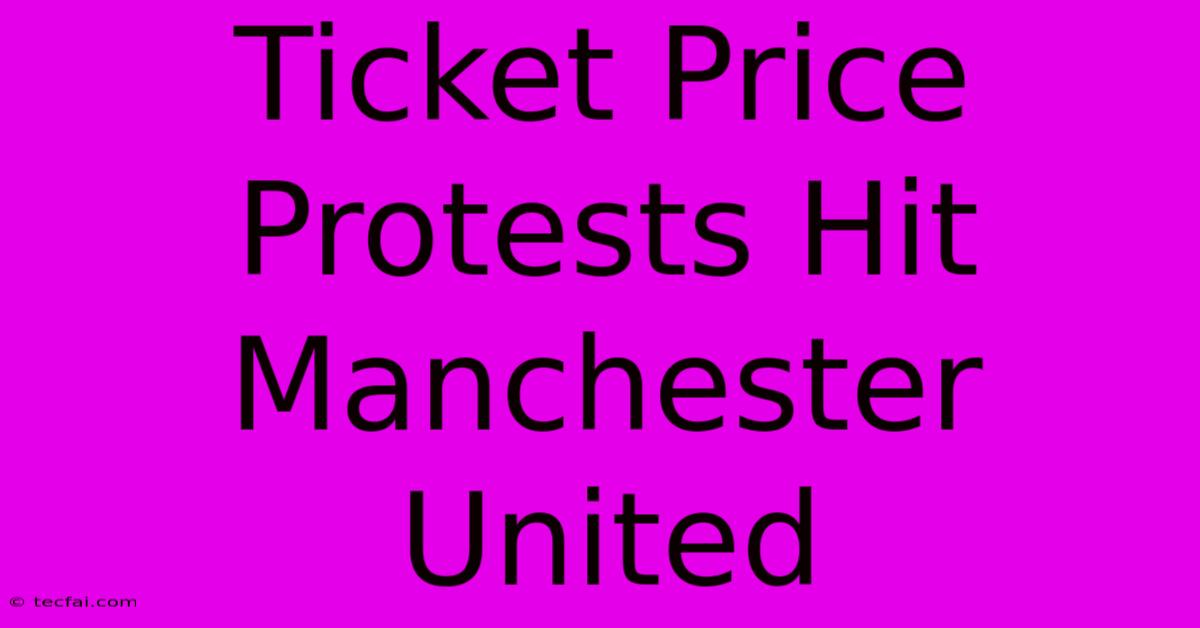Ticket Price Protests Hit Manchester United

Discover more detailed and exciting information on our website. Click the link below to start your adventure: Visit Best Website tecfai.com. Don't miss out!
Table of Contents
Ticket Price Protests Hit Manchester United: Fan Fury and the Future of Football Finance
Manchester United, a club steeped in history and boasting a global fanbase, recently found itself facing a storm of protest. The target? Proposed increases in ticket prices. This isn't just a localized issue; it highlights a wider concern about the escalating cost of supporting football and the growing disconnect between clubs and their loyal supporters.
The Spark Igniting the Fire
The recent announcement of planned ticket price hikes ignited a furious backlash from Manchester United's passionate supporters. Fans, already grappling with the rising cost of living, felt the increase was unjustified, particularly given the club's current on-field performance and the significant investment made in players over recent years. This perceived lack of value for money fueled the protests, transforming simmering discontent into a full-blown crisis.
Methods of Protest: A Show of Strength
The protests weren't subtle. Fans took to the streets, organized demonstrations outside Old Trafford, and utilized social media to amplify their voices. The coordinated nature of the protests showcased the strength of feeling and the potential for sustained action. This wasn't just a few disgruntled individuals; this represented a significant portion of the fanbase united in opposition. Hashtags like #MUFCprotest and #GlazersOut trended globally, demonstrating the widespread impact of the discontent.
The Deeper Issues: Affordability and Fan Engagement
The ticket price issue is symptomatic of a broader problem within modern football. The astronomical sums involved in player transfers and wages often translate to increased ticket prices, making the beautiful game increasingly inaccessible to ordinary fans. This creates a concerning scenario where the very people who built the club's history and identity are priced out of participating. The debate extends beyond Manchester United, reflecting a wider tension between club owners, the financial realities of modern football, and the loyalty of its core supporters.
Beyond the Pitch: The Impact of Ownership
The Glazer family's ownership of Manchester United has been a source of ongoing frustration for many fans. Accusations of prioritizing profit over fan engagement and the club's sporting success have fueled the protests. The ticket price increase is viewed by many as another example of this alleged prioritization of financial gain over the interests of the club's supporters. This sentiment highlights the complex relationship between ownership structures, financial management, and fan loyalty in professional football.
The Future of Football Fan Engagement
This situation serves as a crucial reminder for football clubs worldwide. Ignoring fan concerns can have serious consequences, potentially damaging the relationship between club and supporters. Open communication, a focus on affordability, and genuine engagement with the fanbase are paramount to maintaining a healthy and sustainable relationship. Football clubs must recognize that their fans are not simply consumers but integral parts of the club's identity and success. Ignoring this reality could lead to further alienation and potentially impact the club's long-term future.
Conclusion: A Call for Change
The protests at Manchester United highlight a critical issue facing the world of football: the delicate balance between financial viability and fan engagement. The ticket price issue is more than just a price increase; it’s a symbol of a larger struggle for fair representation and affordability. The response from Manchester United and other clubs will be crucial in determining the future of this relationship and how football clubs navigate the complex financial landscape while maintaining the loyalty and support of their passionate fanbase. The future of the beautiful game depends on it.

Thank you for visiting our website wich cover about Ticket Price Protests Hit Manchester United. We hope the information provided has been useful to you. Feel free to contact us if you have any questions or need further assistance. See you next time and dont miss to bookmark.
Featured Posts
-
Conclave Lithgow On Its Duality
Nov 29, 2024
-
Madix Sings At Macys Thanksgiving Parade
Nov 29, 2024
-
Is Ny Giants Playing Today
Nov 29, 2024
-
Conference League Chelseas Mudryk Moment
Nov 29, 2024
-
Fatal Dui Ex Model Jailed For Crash
Nov 29, 2024
